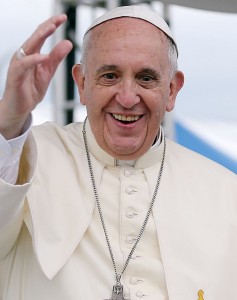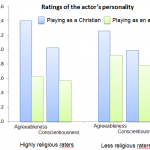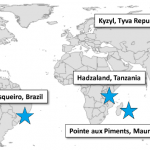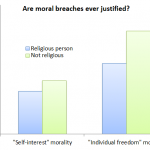Next Thursday, the Vatican is going to release its latest encyclical – a 192 page document entitled “Laudato Si: On the care of the common home” (source: BBC News). The text just got leaked, and it confirms that Pope Francis is going to call for “swift action to protect the Earth and fight global warming”.

Well, better late than never, you might be thinking. After all, it’s 25 years now since the world’s leading scientists and politicians gathered in Rio and formally recognized that human-caused climate change was not only real, but posed a serious threat (the UN Framework on Climate Change).
But, surprisingly, the ramparts of climate change denial are to a large extent manned by religious people. For example, in a paper due to be published soon in Social Science Quarterly, Matthew Arbuckle (University of Cincinnati) and David Konisky (Georgetown University) have revealed widespread scepticism about climate change among religious people.
Using data from a survey of 55,400 Americans back in 2010, they found that people identifying with a religion were significantly less likely than those with no religion to think that climate change is a serious problem that requires immediate action. They were also more likely to think that protecting jobs is more important than protecting the environment.
Not all religious traditions were the same. The Protestants were worse than the Catholics, and the Jews actually were more concerned about climate change than the non-religious (although not at the expense of jobs!).
The more religious they were, the more opposed they were to climate action. And the group most opposed were the evangelical Christians.
Why should religion be linked with anti-environmental attitudes? At first sight, it seems extraordinary.
One suggestion is that Judaeo-Christian traditions preach a worldview centered upon man’s dominion over nature. It’s an idea that’s been around a long time. Here’s Arbuckle & Konisky to explain:
Nearly a half century ago, the eminent historian Lynn White delivered a now often-cited speech before the American Association for the Advancement of Science on the role of religious thought on environmental concern. In this controversial speech, “The Historical Roots of Our Ecological Crisis,” later published in essay format in Science (White 1967), WhiteWhite argued that the Judeo-Christian belief system negatively affects environmental attitudes by promoting an anthropocentric, “dominion over nature” worldview. White pointed to Christian influence dating as far as the Middle Ages as creating an exploitive attitude toward nature in Western culture, an attitude that was intensified by the technological development of the Industrial Revolution, which he argued contributed to an instrumental rationality and a widespread sense of entitlement over the earth and its resources. His analysis was not merely historical, however. White further posited that this historical Christian influence was an important factor in explaining the ecological crisis of the middle of the 20th Century.
They argue that the reason that evangelicals are the most anti-environmental is that they are also the most literal adherents to the Bible. But you know, I don’t think that can be right.
After all, the Pope has now come out strongly in favour of climate action – and that’s a pretty hefty theological judgment. Maybe you could argue that the Pope is a bit liberal in his Bible reading, but then he’s actually playing catch-up with the Southern Baptist convention, the largest evangelical Protestant group in the USA. Back in 2008, they announced that reducing climate emissions was a Christian duty – citing “the biblical principle of creation stewardship”.
I think something else is going on here.















